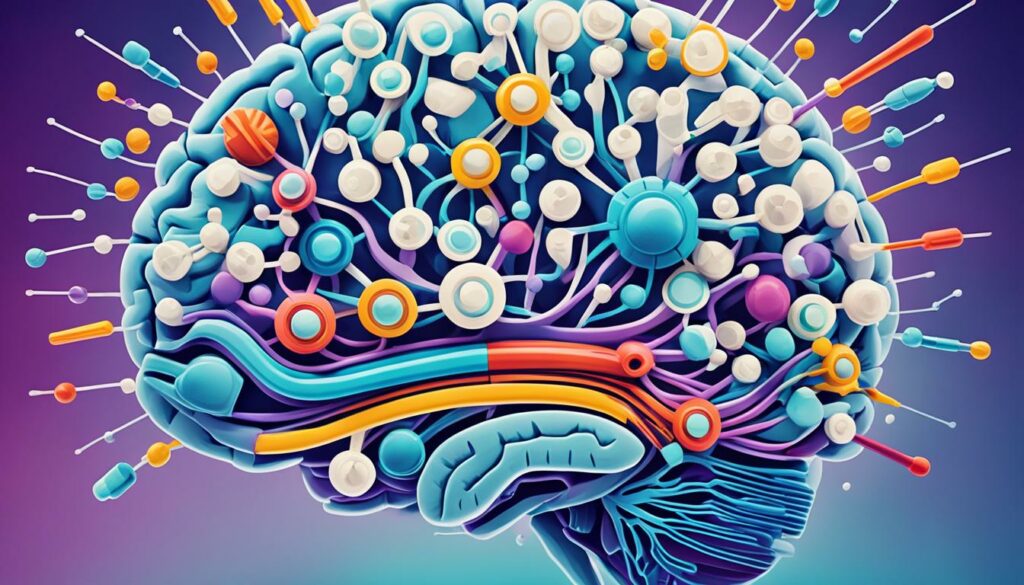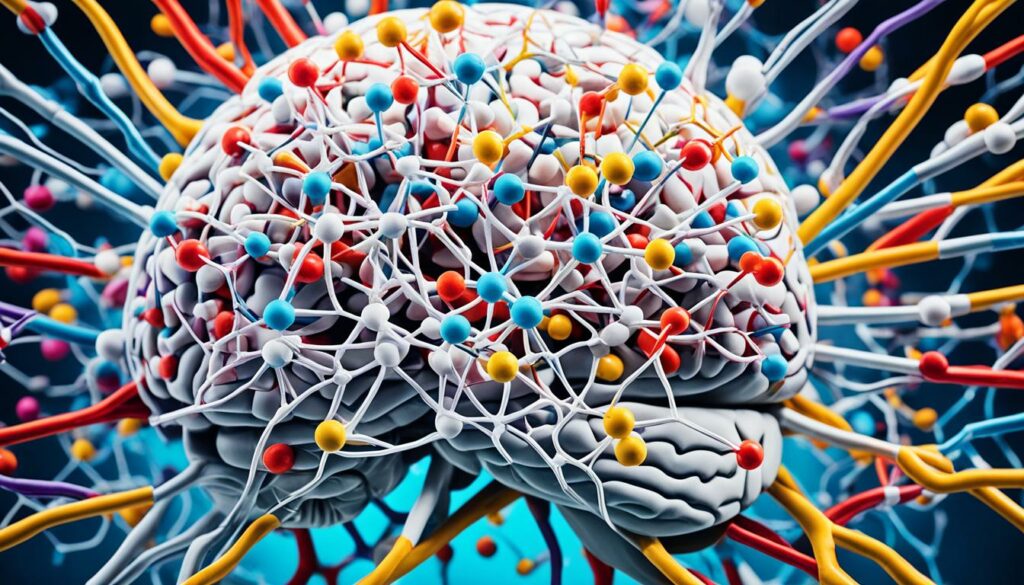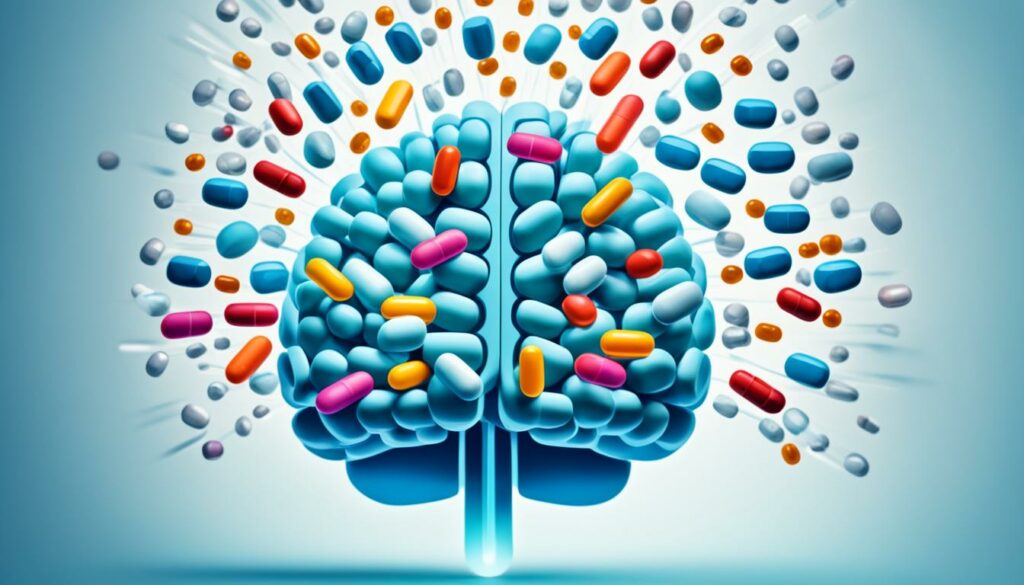Did you know that approximately 6.1 million children in the United States have been diagnosed with Attention Deficit Hyperactivity Disorder (ADHD)? This startling statistic highlights the prevalence of this neurodevelopmental disorder and the need for effective treatment strategies. One such treatment is medication, which plays a vital role in managing ADHD symptoms and improving daily functioning.
Key Takeaways:
- ADHD affects millions of children in the United States, necessitating effective treatment methods.
- Medication is a crucial component of ADHD management and helps reduce symptoms and improve focus.
- Choosing the right medication requires considering individual factors such as symptoms and potential side effects.
- Regular evaluation of medication effectiveness allows for adjustments and optimization of treatment.
- Common side effects of ADHD medication include decreased appetite and difficulty sleeping.
The Role of Medication in ADHD Treatment
In the treatment of ADHD, medication plays a crucial role as part of a comprehensive management plan. While it is not the sole solution, it is an effective tool in reducing symptoms, improving focus, and decreasing impulsive behavior.
ADHD medication works by targeting specific neurotransmitters in the brain to regulate their levels and improve executive functions such as attention and impulse control. It can provide significant relief for individuals with ADHD, allowing them to better manage their symptoms and enhance their daily functioning.
However, it’s important to note that medication should not be a standalone approach. It should be combined with other interventions, including therapy and behavioral strategies, to achieve the best outcomes. These additional therapies can provide individuals with ADHD with the necessary skills, coping mechanisms, and support to navigate the challenges they face on a daily basis.
“Medication is just one piece of the puzzle in ADHD treatment. It’s essential to take a holistic approach that encompasses various strategies to address the unique needs of each individual.”
– Dr. Emily Davis, Child Psychiatrist
Benefits of ADHD Medication:
- Reduces symptoms of inattention, hyperactivity, and impulsivity
- Improves ability to concentrate and focus
- Enhances executive functions such as planning, organizing, and problem-solving
- Increases self-control and decreases impulsive behavior
“ADHD medication can provide individuals with the opportunity to achieve their full potential and experience a greater sense of well-being. It allows them to have more control over their lives and successfully engage in academic, social, and personal endeavors.”
– Dr. Sarah Thompson, Neurologist
Incorporating medication as part of an ADHD treatment plan requires close collaboration between healthcare professionals, parents, and individuals with ADHD. Regular assessment of medication effectiveness, monitoring for any side effects, and making necessary adjustments are essential for optimizing treatment outcomes.
Next, we will explore the process of choosing the most suitable medication for ADHD treatment.
Choosing the Right Medication
When it comes to treating ADHD, selecting the appropriate medication is a crucial step in managing the condition effectively. Doctors take several factors into consideration when making this decision, such as the specific symptoms experienced by the individual, their medical history, and the potential side effects of the medication. It is vital to choose a medication that aligns with the unique needs of each patient.
Different medications for ADHD work in distinct ways, targeting specific mechanisms in the brain to alleviate symptoms and improve overall functioning. One common approach involves increasing the levels of dopamine and norepinephrine, two neurotransmitters that play a significant role in various cognitive functions, including attention and impulse control. By enhancing the availability of these neurotransmitters, these medications help individuals with ADHD improve executive functions, focus, and overall behavioral control.
“The medication prescribed will depend on the individual’s symptoms, medical history, and potential side effects. Different medications work through distinct mechanisms, such as increasing dopamine and norepinephrine levels to improve attention and impulse control.”
By tailoring medication choices to each individual, doctors can optimize treatment outcomes and minimize side effects. It is essential to consult a healthcare professional who specializes in ADHD treatment to determine the most suitable medication and dosage based on the specific needs of the patient.

The understanding of ADHD medication mechanisms is constantly evolving, allowing healthcare professionals to refine treatment strategies and ensure the best possible outcomes for individuals with ADHD.
| Medication Mechanism | Effectiveness | Common Side Effects |
|---|---|---|
| Increase dopamine and norepinephrine levels | Improvement in attention and impulse control | Decreased appetite, difficulty sleeping, mood changes |
| Other Mechanism 1 | Respective Effect 1 | Respective Side Effect 1 |
| Other Mechanism 2 | Respective Effect 2 | Respective Side Effect 2 |
Evaluating the effectiveness of the chosen medication is crucial in managing ADHD. Regular monitoring of symptoms and functioning allows healthcare professionals to assess whether the medication is having the desired impact and make any necessary adjustments in dosage or type of medication.
However, it’s important to note that the choice of medication and the effectiveness may vary for different individuals. What works for one person may not work for another, highlighting the need for personalized treatment approaches that consider each individual’s unique circumstances.
Evaluating Medication Effectiveness
Regularly monitoring the effectiveness of ADHD medication is crucial in managing symptoms and optimizing treatment outcomes. By evaluating symptoms and functioning, healthcare professionals can assess if the medication is effectively managing ADHD symptoms and making a positive impact on daily life.
During the evaluation process, individuals with ADHD and their caregivers are encouraged to provide feedback on symptom changes and any side effects experienced. This feedback helps the healthcare team make informed decisions regarding dosage adjustments or changes in medication type.
Monitoring the effectiveness of ADHD medication involves tracking changes in key areas such as:
- Impulsivity
- Inattention
- Hyperactivity
- Focus and concentration
- Organization and planning
Positive changes in these areas indicate that the medication is effectively managing ADHD symptoms and improving daily functioning.
“Regular and open communication between healthcare professionals, individuals with ADHD, and their caregivers is essential in determining the effectiveness of ADHD medication. This collaborative approach allows for personalized adjustments to ensure the best possible outcomes.”
Adjusting Dosage or Type of Medication
If ADHD symptoms are still not adequately managed or if bothersome side effects persist, adjustments in dosage or the type of medication may be necessary. Healthcare professionals may consider:
- Increasing or decreasing the current dosage
- Switching to a different medication within the same class
- Exploring alternative medication options
Each adjustment aims to find the optimal balance between symptom management and minimizing side effects. It is important to work closely with healthcare professionals throughout this process to ensure a safe and effective treatment plan.
Regular evaluations of medication effectiveness allow for ongoing optimization of ADHD treatment strategies and provide individuals with ADHD the opportunity to lead more fulfilling and productive lives.

Common Side Effects and Overmedication
When it comes to ADHD medication, it’s important to be aware of the potential side effects that may occur. While these effects are usually mild and temporary, understanding them can help individuals and their healthcare providers make informed decisions about treatment options.
Common side effects of ADHD medication may include:
- Decreased appetite
- Difficulty sleeping
- Headaches
- Mood changes
It’s worth noting that not everyone will experience these side effects, and they can vary depending on the specific medication and individual differences. If you or your child is experiencing any side effects, it’s important to consult with a healthcare professional for guidance.
While medication can be beneficial in managing ADHD symptoms, it’s crucial to closely follow the prescribed dosage and not to overmedicate. Overmedication can lead to adverse effects and potentially exacerbate existing symptoms without providing additional benefits.
“Finding the right balance is key when it comes to ADHD medication,” says Dr. Sarah Mitchell, a child psychiatrist specializing in ADHD treatment. “Working closely with your healthcare provider can help navigate potential side effects and determine the optimal dosage for each individual.”
By being vigilant about medication use and communicating openly with healthcare professionals, individuals with ADHD can maximize the benefits of treatment while minimizing any potential risks.

| Side Effects | Prevalence | Suggested Actions |
|---|---|---|
| Decreased appetite | Common | Monitor weight and nutritional intake. Consider an adjusted meal schedule. |
| Difficulty sleeping | Common | Establish a consistent bedtime routine. Avoid taking medication too close to bedtime. |
| Headaches | Less common | Ensure proper hydration. Consider adjusting the dosage or trying a different medication. |
| Mood changes | Varies | Monitor mood closely. Discuss any concerns or significant changes with your healthcare provider. |
Alternative ADHD Treatments
While medication is often an important part of ADHD treatment, there are alternative interventions that can also be beneficial in managing symptoms and improving overall outcomes.
Behavioral therapy is a commonly recommended alternative treatment for ADHD. It focuses on teaching individuals with ADHD new skills and strategies to manage their symptoms. This type of therapy can help with improving attention, organization, and impulse control.
Educational support is another valuable component of ADHD treatment. It involves working closely with teachers and school staff to create personalized plans that address the specific learning needs of individuals with ADHD. This can include accommodations such as extra time for assignments or modified classroom settings to minimize distractions.
Addressing co-occurring conditions such as anxiety or depression is also crucial in ADHD treatment. It is estimated that about two-thirds of individuals with ADHD have at least one other mental health condition. By addressing these co-occurring conditions through therapy, medication, or a combination of both, overall treatment outcomes can be significantly improved.
“Alternative interventions such as behavioral therapy and educational support can complement medication in managing symptoms and improving overall outcomes in individuals with ADHD.”
It is important to note that alternative treatments should be used in conjunction with medication if prescribed by a healthcare professional. While medication can effectively manage symptoms, combining it with other treatments can provide a more comprehensive and holistic approach to ADHD management.
Comparison Table: Medication vs. Alternative Interventions
| Medication | Alternative Interventions |
|---|---|
| Targets ADHD symptoms directly | Addresses underlying behavioral and educational needs |
| May have side effects | Minimal side effects |
| Requires regular monitoring and dosage adjustments | Requires ongoing therapy and support |
| Immediate symptom relief | Long-term strategies for symptom management |

In summary, alternative treatments such as behavioral therapy, educational support, and addressing co-occurring conditions can be valuable additions to medication in the treatment of ADHD. By combining these interventions, individuals with ADHD can experience improved symptom management and overall functioning. It is important to work closely with healthcare professionals to develop a comprehensive treatment plan that best suits the individual’s needs.
Conclusion
ADHD medication is a crucial component of managing symptoms and improving the functioning of individuals with ADHD. Working closely with healthcare professionals is essential to find the right medication that suits the individual’s needs. It is important to understand the mechanism of ADHD medication, its effects, and how it impacts the overall treatment process.
Regular monitoring of the medication’s effectiveness is key to ensuring optimal outcomes. Evaluating symptoms and functioning helps in determining whether the medication is effectively managing ADHD symptoms. Adjustments in dosage or type of medication may be necessary to achieve the best results.
While medication is a cornerstone of ADHD treatment, a comprehensive approach that involves therapy and other interventions can enhance overall outcomes. Alternative treatments such as behavioral therapy, educational support, and addressing co-occurring conditions like anxiety or depression can complement medication and improve the overall well-being of individuals with ADHD.
By combining medication with therapy and other interventions, individuals with ADHD can experience significant improvements in symptom management and overall functioning. With the guidance and support of healthcare professionals, the right medication, monitoring its effectiveness, and addressing side effects, individuals with ADHD can lead fulfilling and productive lives.
